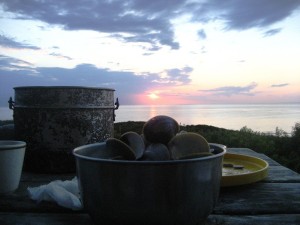 So many persistent problems–the kinds that really won’t change–come down to this one sentence:
So many persistent problems–the kinds that really won’t change–come down to this one sentence:
kjlkjlkjl
Imagine yourself at a beautiful banquet table. It’s covered with precious chinaware, cutlery, and candelabras. You look around, and you see them – your ancestors, so many of whom suffered, experienced trauma, betrayed each other, or somehow lost everything. You are sitting at the table with the generations of your family, and all the terrible history is represented.
You notice, with some concern, that everyone has a lovely plate in front of them, but the plates are empty. Except yours. Yours is piled high with food that looks luscious; the best of everything.
Then, you hear a voice from somewhere: “Eat, enjoy!” A stab of guilt enters your heart – it’s a kind of survivor’s guilt, the feeling of betrayal that comes when you have something your people could not – and you push the plate politely away, saying…
“No thank you. I’m not really very hungry.”
 This parable is symbolic. The “food” can represent all kinds of things: racial justice, having enough, being physically well, having a life without war, having a job, having a soulmate. Our families perhaps did not have that (or contributed to others not having it – another way for this to work), and then unconsciously we can’t bear to have it when they couldn’t.
This parable is symbolic. The “food” can represent all kinds of things: racial justice, having enough, being physically well, having a life without war, having a job, having a soulmate. Our families perhaps did not have that (or contributed to others not having it – another way for this to work), and then unconsciously we can’t bear to have it when they couldn’t.
“No thank you. I’m not really very hungry.”
We then find ourselves mysteriously without enough money, terribly alone, unable to get a job, crushingly depressed – we don’t have the “food” that is part of every person’s birthright and dignity. We are joined to our ancestor’s fates.
I like this parable because, in my experience, people “get it” very quickly. They can feel in their bodies the guilt and the sense of pushing life away in order to belong.
There is a long, long history of food and banquet imagery as a vision for the wholeness of ourselves and the completeness of life for which we long. From time immemorial, peoples have gone to altars to meet their gods and to be fed there.
The image at the top of the article is one beautiful example of this from Christian mysticism, the Russian Rublev Trinity Icon (15th c.). It represents the angels at the Oak of Mamre who announced to Abraham and Sarah that they would have a child in their old age, in the story from the 18th chapter of Genesis. Early Christians felt these three angels were an image of the Trinity – equal, androgynous, generous, hospitable. They point to the bread and the cup that is the essence of the Eucharist – the feast for the world.
 In the Roman world, they celebrated the “convivium,” a ritual meal that gathered friends for discussions over wine and food. It literally means “living together,” or “a gathering for the purposes of celebrating shared life.”
In the Roman world, they celebrated the “convivium,” a ritual meal that gathered friends for discussions over wine and food. It literally means “living together,” or “a gathering for the purposes of celebrating shared life.”
On the Day of the Dead, families gather at cemeteries to have a joyful meal with their honored ancestral dead. Food is brought for all – the living and the dead.
Joy? How can the ritual be joyful? Well, there is one more part of the parable that follows the polite pushing away of the full plate. After I’ve let my clients feel the guilt for a moment, and the innocence that comes from saying they are not very hungry, I invite them to look one more time, because I’ve made a mistake: your ancestors’ plates are NOT empty. They are full, and they have been for some time. They are dead, and at peace, and the suffering has been over for many years.
And then, maybe, we can begin to notice we’re hungry. No, not hungry, famished. Full of desire for life, for love, for all that is proper to being fully human. And we start saying yes, with the smiles of our dead upon us, as we start to eat.
Leslie, this little parable is a bit mind-blowing. I’m sharing it all over the place. The concept of survivor guilt and ancestral “karma,” if you will is not new to me, but this story has a beautiful healing quality and brings in so much tradition. Thank you !
Stacy, I’m so glad this has resonated for you! It seems to have done that for a bunch of folks. And sorry to respond to so tardily – wordpress doesn’t seem to be informing me about new comments these days. 🙁 I just discovered yours. Thank you for posting!